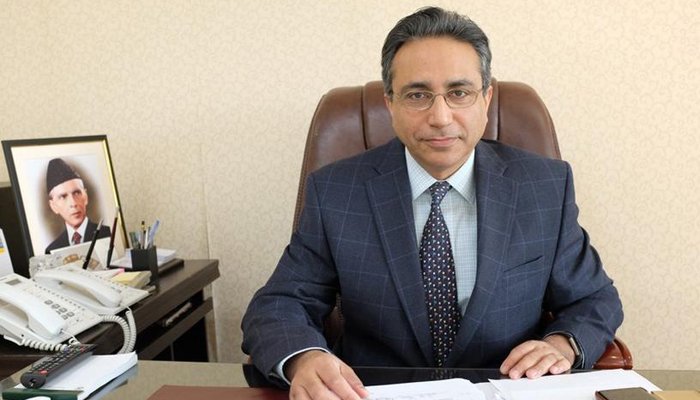PM Imran Khan asks Nadeem Babar to resign as SAPM on petroleum
Nadeem Babar, Secretary Petroleum asked to resign so as not to affect an inquiry into petroleum shortage
ISLAMABAD: Special Assistant to the Prime Minister on Petroleum Nadeem Babar has been asked by Prime Minister Imran Khan to resign from his post.
This was revealed by Planning Minister Asad Umar in a press conference on Friday during which he discussed the findings by the Federal Investigation Agency in a probe ordered by the premier to ascertain the reasons behind petroleum shortages in the country.
"Secretary for Petroleum Division (Mian Asad Hayauddin) will also be asked to report to the Establishment Division once his replacement is finalised," Umar said.
Umar, in his detailed media briefing, went over the final recommendations made by the cabinet committee formed by the premier to conduct the probe.
The committee included Umar himself, along with federal ministers Shafqat Mehmood, Azam Swati, and Shireen Mazari.
Adding to Asad Umar's point, Minister Shafqat Mehmood said that Nadeem Babar and Secretary Petroleum have been asked to resign so as not to affect the inquiry.
"We forwarded our recommendations to the prime minister, after which he asked for some additional information. When some more information came to the fore, we were given the go-ahead to share our recommendations," said Asad Umar.
He added that in the past, the Petroleum Division used to put all the responsibility on the shoulders of the Oil and Gas Regulatory Authority (OGRA) whenever questions related to petroleum shortages were raised.
"We have to end this ambiguity," said Asad Umar. "There are very few penalties for those who harm the economy. The mafia which is working to loot people's money, Prime Minister Imran Khan won't spare them."
"This is a message from Prime Minister Imran Khan to the mafia that their time is up," the planning and development minister maintained.
Answering a question, Asad Umar said that there is no doubt in believing that the responsibilities given to some state institutions were not duly fulfilled.
"We have to find out why the institutions could not perform and ascertain whether this is due to the prevalence of corruption," he said, adding that it is important to discover the names of the people who have not been doing their jobs properly and whether they have any accomplices.
'FIA tasked with making criminal acts prosecutable'
As reported by Geo.tv, the cabinet's recommendations have been divided into three categories. According to Asad Umar, in the first category, details of criminal acts have been provided under which criminal cases should be registered.
"The evidence to be formulated in a way that charges can be brought. FIA has been told to do a forensic audit so that within 90 days prosecution efforts can begin," Umar said.
The following are the areas that FIA has been tasked to investigate:
- Was the legal requirement for a minimum inventory fulfilled by the oil companies?
- Were the sales figures that were reported actual numbers or was there a discrepancy between what was reported on paper and what was actual? Who reported these?
- Was the product hoarded? If so, then who was responsible?
"These are all those things which in the report are prima facie [...] it was determined that these did occur. So I am just saying that the evidence has to be given such a shape that it is prosecutable in court," explained Umar.
He also spoke of certain deficiencies in the system, which also saw legal violations, for example, undue advantage taken of temporary marketing licences, illegal hospitality agreements for where the product will be kept, and the product's sales at illegal outlets.
The minister also spoke of a key allegation in the report regarding delayed berthing of an oil ship so that when new rates are notified, the product can be sold at a higher rate. "A forensic investigation and pinpointing in this also needs to be done to ascertain who was responsible," Umar said.
He said illegal sales will also be covered in the forensic audit.
"Action will not only be limited to fines. This will be done so people are handcuffed and sent to jail."
The minister further said that although oil retail companies and fuel stations will be targeted in the forensic audit, it must also investigate which government officials facilitated such criminal acts.
"The Petroleum Division will be investigated, as well as OGRA (Oil and Gas Regulatory Authority), Ministry of Maritime Affairs and Port Authority," for all the illegal, aforementioned acts, said Umar.
-
Security forces gun down 30 terrorists in multiple IBOs in KP: ISPR
-
MQM-P calls for new province in Sindh
-
US report validates Pakistan military edge over India: PM
-
Banned TTP poses serious threat to Pakistan security: UNSC panel
-
CM Afridi clarifies remarks on by-poll after ECP requests army deployment
-
Dubai sees 3.2m Pakistani passengers in 2025 as airport sets new milestone
-
Security forces kill 23 Indian proxy terrorists in KP's Kurram
-
Pakistan to construct island to boost oil exploration: report












